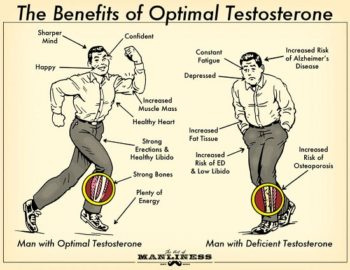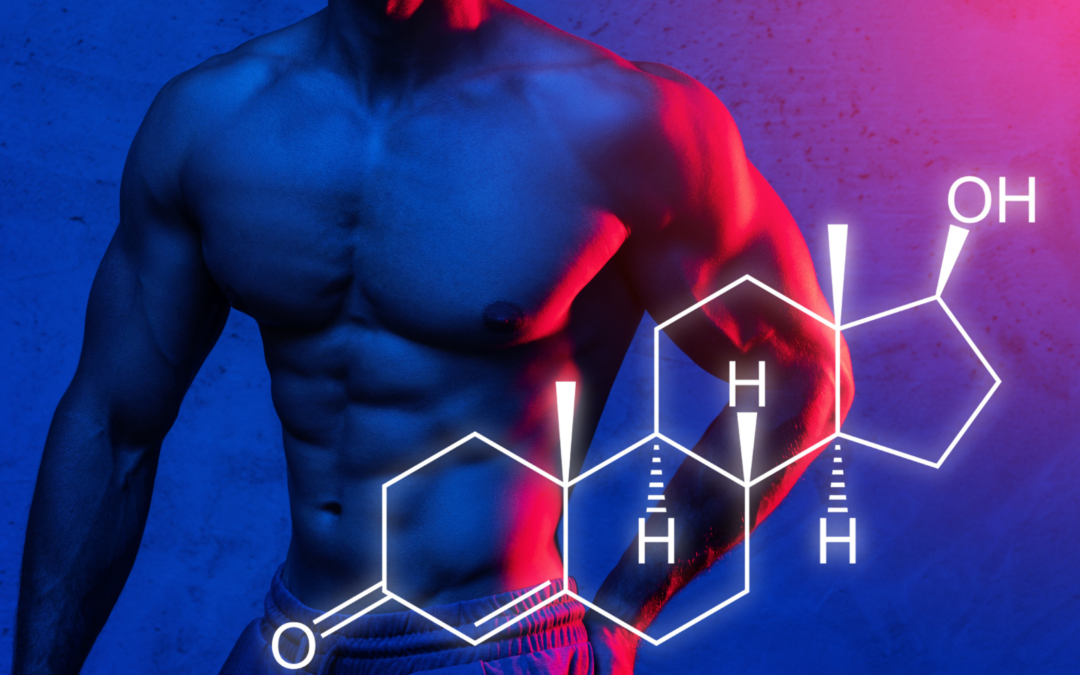Testosterone plays many roles in the body. It dials up metabolism, burns fat, builds muscle, builds bone, balances mood, and increases energy. Testosterone was shaped by evolution to increase the survival of humans by fostering the qualities and energy one would need to hunt, fight or flee, construct shelters, reproduce, and overall be hard to kill. Testosterone is important in supporting a vital and resilient lifestyle. Testosterone is not just for men; women also have and need testosterone and can develop symptoms if they have too much or too little.
Low Testosterone: Normal vs. Abnormal
You have probably heard or seen ads for low testosterone or “low T.” Other names may include andropause, androgen deficiency, late-onset hypogonadism, and male menopause. Unlike the steep drop in estrogen that accompanies menopause, andropause is a much slower decline in testosterone experienced by those with testes. Testosterone levels peak in our late 20s and drop 1.2% per year after 30 years of age!
However, studies show that our population’s levels of testosterone have been declining over the generations. Dr. Paolone, in a 2017 UW article, pointed out that 39% of men 45 years and older have low testosterone when measured. Other studies show that testosterone levels are dropping faster than can be explained by aging, obesity, diet, and an inactive lifestyle, all of which have been associated with lower testosterone levels.
For example…“a 65-year-old man in 2002 would have testosterone levels 15% lower than those of a 65-year-old in 1987.” There is growing evidence that our exposure to modern industrial chemicals is meddling with hormones, including testosterone. These so-called endocrine disruptors include fire retardants, BPA, phthalates, benzenes and organophosphates. See the EWG.org article to learn more about them and how to reduce exposure.

Image from: https://www.artofmanliness.com/articles/testosterone-benefits/
Signs of Low Testosterone:
Low levels of testosterone can cause a wide range of symptoms. Some of the more severe symptoms are infertility, loss of muscle mass, erectile dysfunction, low libido, and lack of facial hair. More subtle symptoms include depression, irritability, fatigue, and difficulty losing weight or gaining muscle mass. I like the graphic from the popular podcast, Art of Manliness, as I think it gives a good summary of the benefits of having optimal testosterone levels.
How to Know If You Should Get Tested:
Testosterone is only one piece of the health puzzle, but it is an important one. Your doctor’s individual assessment will help to determine if checking testosterone would be beneficial. Studies show that a simple blood test is the most clinically useful way to assess testosterone status. Your doctor will help determine if your testosterone levels are likely a cause of your symptoms and whether natural or supplemental treatments are right for you.
Natural Ways to Increase Testosterone:
Not everyone with low testosterone and symptoms needs testosterone supplementation. There are many natural ways to increase testosterone naturally:
- Weight loss:
- Fat tissue turns your testosterone into estrogen. So, losing weight can increase your testosterone levels.
- Weight lifting:
- Weight lifting stimulates your body’s ability to produce testosterone, the body’s clever way of adapting to physical challenges. Heavy weights with lower reps is ideal for this.
- Decrease alcohol consumption.
- Morning sexual activity:
- Yep, testosterone levels are actually highest in the mornings and sexual activity is another way to stimulate T production!
- Competition/believing you’re a winner:
- In a study of 6 collegiate tennis players, testosterone levels rose before the match. Also, the winner’s average testosterone levels after the match rose compared to the losers.
- Another study measured testosterone before and after a rowing competition, but the researchers about who won the race. “The men who believed they had won received an average testosterone increase of 4.92%, while those convinced they had lost dropped by an average of 7.24%. Overall, men who thought they were winners had testosterone levels 14.46% higher than their deflated opponents.”
- Sleep:
- Aim for 7-8 hours of sleep. Sleep is vital for testosterone production.
- Correct nutrient deficiencies:
- Have your vitamin D levels checked, and increase levels if needed.
- Omega 3 oils, from fatty fish. Talk to your doctor about the best sources.
- Correct zinc deficiency, if a blood test shows insufficient levels.
- Eat brassicas like broccoli:
- Broccoli contains compounds called indoles which have been shown to help with eliminating the bad estrogen breakdown products that hinder testosterone.
- Broccoli contains compounds called indoles which have been shown to help with eliminating the bad estrogen breakdown products that hinder testosterone.
Testosterone supplementation:
Sometimes testosterone replacement is the treatment of choice based on labs and symptoms. The most common replacement methods include creams, and once to twice weekly injections that patients are taught to do on their own. Your doctor can help you determine if testosterone therapy is an option for you, and which delivery method may be best. Regular follow ups with your doctor are required to monitor therapy so any needed dose adjustments can be done to ensure safety and good results.


